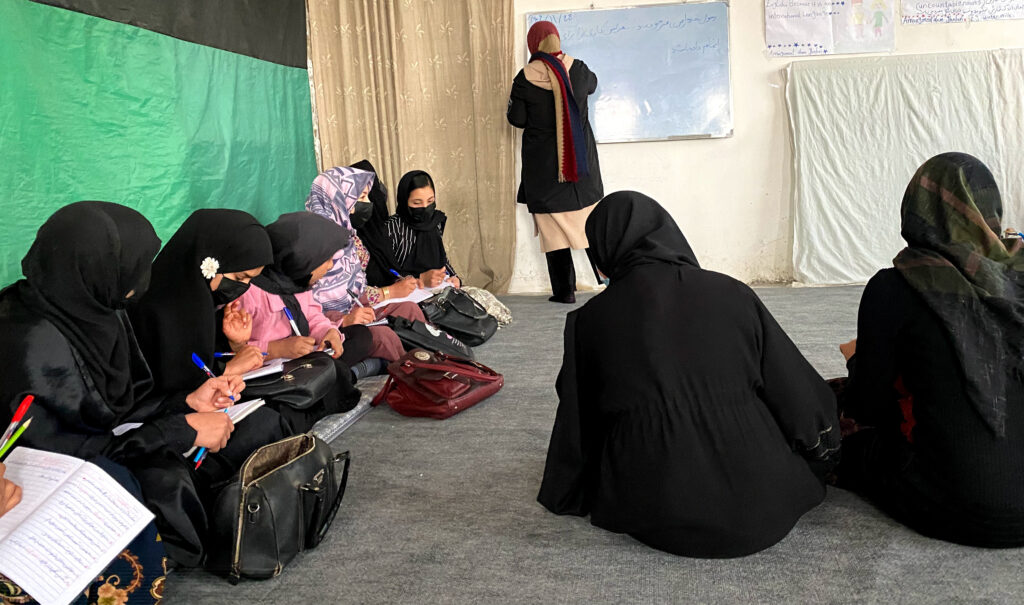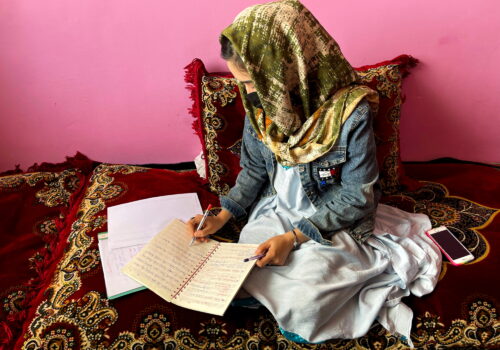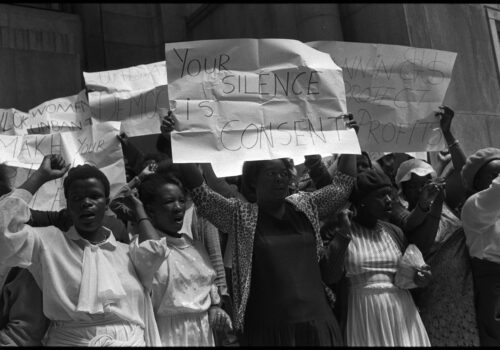It has been more than four years since Afghanistan fell to the Taliban. In that time, women and girls have been stripped of their most basic rights, barred from education, employment, and public life, and forced back into their homes. While the global struggle for gender equality pushes forward elsewhere, in Afghanistan, the fight has been reduced to one essential demand: the right to learn. This demand carries with it fear, hope, and the risk of punishment.
These years of Taliban rule have been marked by resistance, defeat, resilience, and humiliation. Each woman’s story reveals a fragment of today’s Afghanistan and the weight carried by its women. This article features the voices of three young women from different fields and professions, each one a mirror to the dark reality of these years. I met the women I interviewed for this article through my work with Women Beyond Borders, a women-led organization that provides online human rights education and well-being classes for Afghan women, primarily those still inside the country. The interviews were conducted online and all names in this article have been changed to pseudonyms to protect the interviewees, as it is forbidden for women to speak publicly in Afghanistan.
Farida’s story: The last generation of midwives battling for life
Midwifery was not Farida’s dream. She had been a law student with aspirations to become a defense lawyer when the Taliban’s restrictions on women’s education forced her to change majors. She entered midwifery instead, but even that door soon closed. “Mine was the last class to graduate from this program,” she says.
Since the collapse of Afghanistan’s economy following the Taliban takeover, most patients can no longer afford private hospitals. Regime-run maternity wards are overwhelmed and lack even basic supplies. “Women must bring their own necessities for childbirth,” Farida explains. “Seeing them waiting for hours in the winter cold for a sonogram is truly painful.”
With midwifery education banned, the shortage of skilled workers has reached crisis levels. In one ward, “only three midwives handle all deliveries, leaving women without safe care,” Farida says. Family planning has collapsed too. “Some secretly used hormonal drugs, but now there’s no access,” she says. “The only option left is condoms, yet many husbands forbid them, and mullahs denounce them as un-Islamic.”
She recalls one woman in her forties: “She wanted a tubal ligation because her husband insists on more children. But all medical procedures to prevent pregnancy are forbidden.” Acts of violence against women multiply under Taliban rule: an act of violence from inside the home is reinforced by another from a regime that controls women’s bodies.
A head midwife adds: “We see rising domestic violence. Men can now act with more impunity. Pregnant women come in on the verge of losing their babies, or even their own lives, because of beatings.”
Restrictions on women’s movement without a mahram (male guardian) have driven up home births, which are often unsanitary and deadly. Fatal bleeding, infections, and cases of surgical gauze left inside women’s bodies are rising.
And yet, despite this desperate need, female graduates are prohibited from working. “The health system is collapsing, but the Taliban issue work permits to doctors from abroad, in countries such as India, while Afghan women sit at home,” Farida says bitterly.
Amina’s story: Weaving hope amid oppression
“Talking about the last four years is like flipping through a diary filled with pain, passion, and resilience,” says Amina, the owner of a small clothing brand.
In 2019, she started her brand in a tiny room with two sewing machines and a few meters of fabric. A psychology graduate, she poured her creativity into garments. “Every stitch was a story of women striving to be seen,” she says.
On August 15, 2021, Amina was at her workshop when her family called: the Taliban had entered Kabul. She locked up and rushed home. “They didn’t just take my job,” she recalls. “They stole my dreams, my goals, and part of my existence. I felt like a broken soul.”
A month later, she cautiously reopened her shop, hiring back both male and female workers. Within just a few days, Taliban officials raided it. They insulted and humiliated her employees for working in mixed spaces. She tried separating the workshops by gender but in the end was forced to close her shop entirely and continue only online.
Her ordeal didn’t end there. “One day, while I was traveling with my brother to Shahr-e-Naw to deliver clothes, a Taliban soldier stopped us. He told my brother, ‘A man whose sister drives should die of shame.’ When my brother defended me, they took us both to their station. I had to sign a pledge never to drive again.”
Last month, she saw Taliban forces detaining women in markets, restaurants, even on the streets. “I’ve seen them beaten, dragged by their hair, and thrown into vehicles. I have not left home in weeks.” Still, she clings to the hope that one day she will live without fear—that the walls of her home will no longer feel like a prison.
Samira’s story: A teenage girl caught between a nightmare and hope
“It was noon. My English class was at one, and I was slowly getting ready,” recalls Samira, a young woman from Herat who was barely sixteen on August 15, 2021. “That day was not like others—rumors echoed everywhere. Fear was in the air. Some couldn’t believe Afghanistan would fall so easily. Neither could I. How could we return to the days in A Thousand Splendid Suns?” she says, referring to the 2007 novel by Afghan-American author Khaled Hosseini, which depicts women’s experiences under the first Taliban government.
At 12:45 p.m., a friend called her, urging her to come to class. As she headed out, her family blocked her path, warning that the Taliban was near the city. “I became angry. I thought: Impossible! This generation won’t surrender so easily.”
By 2:00 p.m., another call confirmed the chaos. “Gunfire was echoing, fear spreading,” she remembers. “My friends said their brothers scolded them for going to class. We knew then our happiness was over, and pressure from the Taliban, and our own families, would only intensify.”
As she and her family fled the city center, two images stayed with her. One was across from her school on Mstufiat Road—a police ranger wearing a uniform that reminded her of the Afghan flag, along with officers pacing anxiously, their eyes fixed on an uncertain future. The other was the school itself. “I didn’t know my last day there would truly be the last,” she says quietly.
“I miss everything, my friends, teachers, exams, even the blackboard,” she says. “Four years of my life disappeared into a corner of my home. That day was the end. I never saw the ranger or those officers again. I never thought I would long for such ordinary moments, but I do.”
***
Farida, Amina, and Samira’s voices reflect only a fraction of the immense crisis facing the women of Afghanistan today. Deprived of education, employment, and autonomy, they endure collapsing health services, closed schools, and growing violence. Every day brings new restrictions—on their bodies, their work, their presence in society.
These are just three stories. In every province, countless women face even deeper pain and despair under a system of gender apartheid unparalleled in the world today.
Amid this suffering, it is important not only to document that grim reality but also to honor Afghan women’s persistence: their fight to preserve dignity, resist erasure, and hold onto hope under the harshest of conditions. Confronting this crisis demands more than sympathy; it requires global solidarity and the creation of safe structures for the women and girls of Afghanistan.
Mursal Sayas is a human rights advocate and the founder and CEO of Women Beyond Borders / Les Femmes Au-delà des Frontières. She is also the author of Qui Entendra Nos Cris?
This article is part of the Inside the Taliban’s Gender Apartheid series, a joint project of the Civic Engagement Project and the Atlantic Council’s Strategic Litigation Project.
Further reading
Mon, Sep 15, 2025
Education as resistance: How women in Afghanistan fight gender apartheid through solidarity
Inside the Taliban's gender apartheid By
Even under the Taliban’s gender apartheid, the women and girls of Afghanistan continue to learn, build, and gain leadership skills with the help of community mentors and small stipends.
Thu, Aug 14, 2025
South African women’s resistance holds lessons for the women of Afghanistan fighting gender apartheid
Inside the Taliban's gender apartheid By
Farhat Ariana Azami in conversation with Gertrude Fester, a veteran South African anti-apartheid activist, and Munisa Mubarez, a women’s rights advocate from Afghanistan.
Wed, Jul 9, 2025
Five questions (and expert answers) about the ICC arrest warrants against Taliban leaders for crimes against women and girls
New Atlanticist By
Our international law experts unpack the implications of the International Criminal Court’s arrest warrants against the Taliban’s supreme leader and chief justice.
Image: Under the Taliban, girls are forbidden from attending school after the sixth grade. Older girls continue to be taught in this underground school. August 13, 2025. Fariba Akbari/dpa via Reuters Connect.




